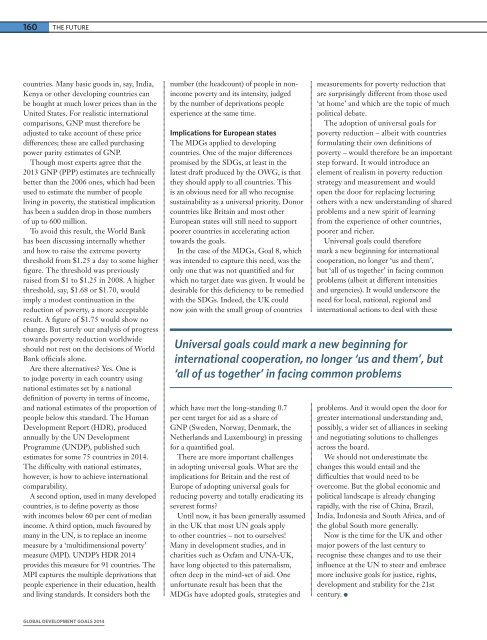FAMBB
FAMBB
FAMBB
Create successful ePaper yourself
Turn your PDF publications into a flip-book with our unique Google optimized e-Paper software.
160 THE FUTUREcountries. Many basic goods in, say, India,Kenya or other developing countries canbe bought at much lower prices than in theUnited States. For realistic internationalcomparisons, GNP must therefore beadjusted to take account of these pricedifferences; these are called purchasingpower parity estimates of GNP.Though most experts agree that the2013 GNP (PPP) estimates are technicallybetter than the 2006 ones, which had beenused to estimate the number of peopleliving in poverty, the statistical implicationhas been a sudden drop in those numbersof up to 600 million.To avoid this result, the World Bankhas been discussing internally whetherand how to raise the extreme povertythreshold from $1.25 a day to some higherfigure. The threshold was previouslyraised from $1 to $1.25 in 2008. A higherthreshold, say, $1.68 or $1.70, wouldimply a modest continuation in thereduction of poverty, a more acceptableresult. A figure of $1.75 would show nochange. But surely our analysis of progresstowards poverty reduction worldwideshould not rest on the decisions of WorldBank officials alone.Are there alternatives? Yes. One isto judge poverty in each country usingnational estimates set by a nationaldefinition of poverty in terms of income,and national estimates of the proportion ofpeople below this standard. The HumanDevelopment Report (HDR), producedannually by the UN DevelopmentProgramme (UNDP), published suchestimates for some 75 countries in 2014.The difficulty with national estimates,however, is how to achieve internationalcomparability.A second option, used in many developedcountries, is to define poverty as thosewith incomes below 60 per cent of medianincome. A third option, much favoured bymany in the UN, is to replace an incomemeasure by a ‘multidimensional poverty’measure (MPI). UNDP’s HDR 2014provides this measure for 91 countries. TheMPI captures the multiple deprivations thatpeople experience in their education, healthand living standards. It considers both thenumber (the headcount) of people in nonincomepoverty and its intensity, judgedby the number of deprivations peopleexperience at the same time.Implications for European statesThe MDGs applied to developingcountries. One of the major differencespromised by the SDGs, at least in thelatest draft produced by the OWG, is thatthey should apply to all countries. Thisis an obvious need for all who recognisesustainability as a universal priority. Donorcountries like Britain and most otherEuropean states will still need to supportpoorer countries in accelerating actiontowards the goals.In the case of the MDGs, Goal 8, whichwas intended to capture this need, was theonly one that was not quantified and forwhich no target date was given. It would bedesirable for this deficiency to be remediedwith the SDGs. Indeed, the UK couldnow join with the small group of countrieswhich have met the long-standing 0.7per cent target for aid as a share ofGNP (Sweden, Norway, Denmark, theNetherlands and Luxembourg) in pressingfor a quantified goal.There are more important challengesin adopting universal goals. What are theimplications for Britain and the rest ofEurope of adopting universal goals forreducing poverty and totally eradicating itsseverest forms?Until now, it has been generally assumedin the UK that most UN goals applyto other countries – not to ourselves!Many in development studies, and incharities such as Oxfam and UNA-UK,have long objected to this paternalism,often deep in the mind-set of aid. Oneunfortunate result has been that theMDGs have adopted goals, strategies andmeasurements for poverty reduction thatare surprisingly different from those used‘at home’ and which are the topic of muchpolitical debate.The adoption of universal goals forpoverty reduction – albeit with countriesformulating their own definitions ofpoverty – would therefore be an importantstep forward. It would introduce anelement of realism in poverty reductionstrategy and measurement and wouldopen the door for replacing lecturingothers with a new understanding of sharedproblems and a new spirit of learningfrom the experience of other countries,poorer and richer.Universal goals could thereforemark a new beginning for internationalcooperation, no longer ‘us and them’,but ‘all of us together’ in facing commonproblems (albeit at different intensitiesand urgencies). It would underscore theneed for local, national, regional andinternational actions to deal with theseUniversal goals could mark a new beginning forinternational cooperation, no longer ‘us and them’, but‘all of us together’ in facing common problemsproblems. And it would open the door forgreater international understanding and,possibly, a wider set of alliances in seekingand negotiating solutions to challengesacross the board.We should not underestimate thechanges this would entail and thedifficulties that would need to beovercome. But the global economic andpolitical landscape is already changingrapidly, with the rise of China, Brazil,India, Indonesia and South Africa, and ofthe global South more generally.Now is the time for the UK and othermajor powers of the last century torecognise these changes and to use theirinfluence at the UN to steer and embracemore inclusive goals for justice, rights,development and stability for the 21stcentury.GLOBAL DEVELOPMENT GOALS 2014


